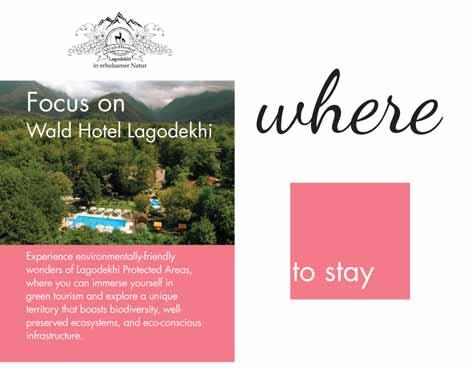FOCUS ON UKRAINE
World Vision celebrates Ukraine Independence Day as part of its extensive program of support for Ukrainian citizens PAGE 8


World Vision celebrates Ukraine Independence Day as part of its extensive program of support for Ukrainian citizens PAGE 8

The United Nations recognizes that young people around the world are key agents for social change, economic development and technological innovation. It has further recognized that youth should participate in decision-making processes, since their outcomes affect both their lives and their futures. In addition to being able to mobilize support, the contributions and unique perspectives of young people need to be factored in when shaping the future (World Program of Action for Youth, A/RES/50/81, Paragraph 104; United Nations Conference on Environment and Development, Agenda 21, paragraph 25.2).
WHAT IS A UNITED NATIONS
YOUTH DELEGATE?
In this week’s issue...
Georgia: EU Supports Campaign on Personal Data Protection
NEWS PAGE 2
CENN Executive Director Nana Janashia Dies Tragically at 51
NEWS PAGE 3
Borys Tarasyuk: A Ceasefire May Only Lead to Russia Preparing Another War
POLITICS PAGE 4
Russia and its Influence in the Balkans
BUSINESS PAGE 5
MONTHLY TOURISM UPDATE – Revenues from International Travel to Georgia in the First Half of 2023
BUSINESS PAGE 6
Investing in an Apartment in Tbilisi for Income Purposes
BUSINESS PAGE 7
Increased Cost-of-Living Crisis Undermines Progress on Poverty Alleviation in Asia and Pacific
SOCIETY PAGE 9
UNDP Georgia Head Nick Beresford Passes Away
SOCIETY PAGE 10
Don’t the Museums Matter? The Chiatura Manganese Mining History Museum
Continued on page 9
The United Nations General Assembly has recommended that Member States include a youth representative in their delegations, starting in 1981 with Resolution RES/36/17.
CULTURE PAGE 11

The European Union Delegation to Georgia and the United Nations Development Program (UNDP) have supported a campaign on personal data, which is currently underway in the Georgian capital – Tbilisi.
Information posters, which can now be seen in buses and Tbilisi metro trains, have been prepared by the Personal Data Protection Service (PDPS).
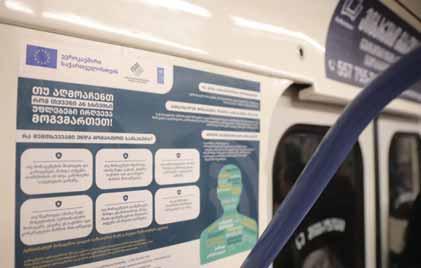
From the displayed posters, one can learn what personal data is, what potential risks are associated with providing personal information, in what cases rights are considered violated and how to contact the Personal Data Protection Service.
The initiative was supported by European Union in Georgia and UNDP Georgia under the #HumanRights4All project.
The information campaign will later be extended to other cities in Georgia.
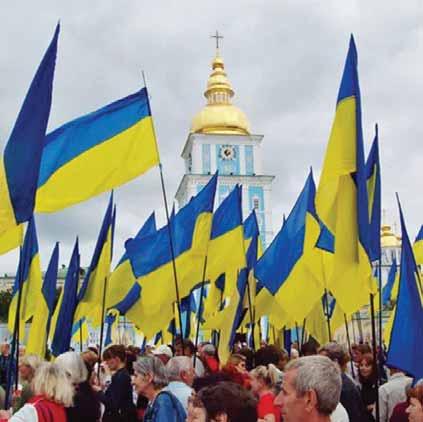 BY MARIAM GORKHELASHVILII
BY MARIAM GORKHELASHVILII
On August 24, Ukraine celebrates its 32nd Independence Day.
On August 24, 1991, the Supreme Council of the Ukrainian Soviet Socialist Republic adopted the Act of Independence of Ukraine. The council was headed by Leonid Kravchuk, who later became the fi rst president of independent Ukraine.
Today’s President of Ukraine, Volodymyr Zelensky, addressed the Ukrainian people. In his video address, he told citizens that the Independence Day of Ukraine is a holiday of free, strong, dignified, and equal people. Zelensky also thanked everyone who cares about Ukraine’s defense, including journalists, Ukrainian arms manufacturers, and of course soldiers and their families.
“When we are proud to have sunk the flagship cruiser of the enemy’s fleet
‘Moscow’ and are happy to hit the Crimean bridge, we thank those whose names we cannot say today, but in the future, books will be written and movies will be made about them,” he said.
He added that, together, Ukrainians were able to do that when one person says: “Glory to Ukraine!”, the whole world responds: “Glory to the heroes!”
The Ministry of Foreign Affairs of Georgia published a post on Twitter in connection with the Independence Day of Ukraine and wished the Ukrainian people “peace and prosperity”.
“We heartily congratulate Ukraine on its Independence Day! Georgia stands in solidarity with Ukraine and remains a loyal supporter of Ukraine’s sovereignty and territorial integrity. Georgia wishes the Ukrainian people peace and prosperity. Congratulations on Ukraine’s Independence Day!”- the message read.
This is the second year that Ukraine is at war with Russia on its Independence Day. Russia started large-scale military operations against Ukraine on February 24, 2022.
Russia’s most powerful mercenary, founder of the Wagner Group Yevgeny Prigozhin, was on board a plane which crashed on Wednesday evening north of Moscow, the Russian authorities claim.
The Embraer Legacy was flying between Moscow and St Petersburg when it crashed in the Tver region 30 minutes

after takeoff. There were no survivors among the seven passengers, which also counted Prigozhin’s right-hand man Dmitry Utkin, and three crew members.
The crash occurred two months after Prigozhin led a mutiny against Russian army chiefs for an “incompetent prosecution” of Russia’s war in Ukraine.
While we have yet to hear an official comment from the Kremlin on Prigozhin’s fate,
his Telegram channel, Grey Zone, has pronounced him dead, hailing him a hero and patriot. It further claimed, without providing evidence, that the jet had been shot down by the Russian military, leading to their leader dying at the hands of unidentified people it called “traitors to Russia.” Mourners have begun leaving flowers and candles near Wagner’s offices in St Petersburg.
Eurowings, the German lowcost airline, has unveiled its plans to inaugurate direct flight services between Berlin and Tbilisi by the close of 2023, as reported by the German travel website Reisetopia.
The airline, a subsidiary under the Lufthansa Group, is poised to launch its maiden non-stop flight on Decem-
ber 18. Prospective passengers can already secure tickets for this route through Eurowings’ official website, with prices starting at 130 euros. The journey is estimated to be 4 hours and 15 minutes.
According to Reisetopia, the BerlinTbilisi direct flights are scheduled exclusively for Mondays, with the following timetable:
– EW8100
| Berlin – Tbilisi
– Departure: 12:10
– Arrival: 18:55
– EW8101
| Tbilisi – Berlin
–
Departure: 19:55
–
Arrival: 21:10
Currently, the only existing option for direct travel between the capitals of Germany and Georgia is provided by Georgian Airways, which operates flights twice a week—on Wednesdays and Saturdays.
The introduction of Eurowings’ direct flights on this route is expected to enhance travel convenience and accessibility, providing more choices for passengers seeking seamless connectivity between these two cities.


News broke last Saturday of the tragic, untimely death on August 17 of CENN Executive Director Nana Janashia, who was struck by lightning while on a beach in the Dominican Republic with family and friends.
"We have lost a person who spent her whole life striving for a better world," CENN wrote in its announcement.
Nana Janashia founded CENN, the Caucasus Environmental NGO Network, in 1998, and for 25 years strove with her team to make Georgia a better placeimproving lives and protecting nature.
"The organization has implemented around 300 important projects in the Caucasus region and contributed to the creation of a green and sustainable future," CENN notes of the impactful
work Nana's organization had and will continue to have for Georgia and the region.
Nana is survived by her son, Leon, and her husband, Laurent. CENN wrote that, "Shortly after Nana's death, Leon saw a large rainbow in the sky and said that 'Naniko tells us she's in heaven,' pointing to her star in the evening sky. May her light always shine as it did throughout her life."
“Nana Janashia was truly a strong and visionary public figure, and she will be missed not only in the environmental sector but by the whole country,” CENN wrote in a letter to mourners waiting to pay their respects. “We would like to inform you that due to administrative procedures, it is not yet possible to specify the date of the farewell ceremony, which will definitely take place in Tbilisi
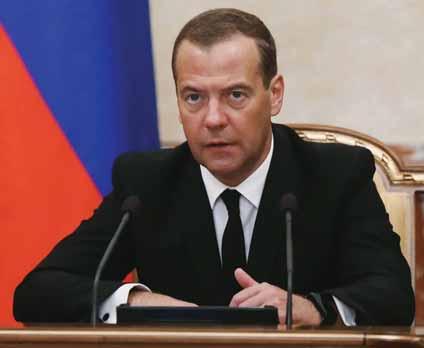
independent states, while most United Nations members view them as Russianoccupied Georgian territory.
In an article published by Russian newspaper Argumenty i Fakty on Wednesday, the 15th anniversary of Medvedev's decree, he wrote: "The idea of joining Russia is still popular in Abkhazia and South Ossetia. It could quite possibly be implemented if there are good reasons to do so."
Such reasons count Georgia taking steps towards joining NATO.
"We will not wait if our concerns move closer to reality," Mr Medvedev noted. Both Abkhazia and South Ossetia held autonomous status in Georgia during the soviet period, and when Georgia declared independence in 1991, both regions declared their own intention to break away.
This led to armed conflicts between the separatists and the new Georgian government, who sought to take control of the regions by force.
in the near future. We will provide you with detailed information soon.
To its supporters, CENN wrote: “Once again, thank you very much for your kind words, cooperation and for the great work we did together for 25 years. The CENN team will do everything possible to continue building democracy and creating a better future for our country and the Caucasus region.”
GEORGIA TODAY has worked alongside CENN for many years, sharing the great work they do with wider society. It is with great sadness that we send our condolences to Nana's family, friends, and all who were so positively touched by her boundless energy, positivity and optimism. Let us continue her legacy to make Georgia, and the world, a cleaner, kinder and more environmentally sustainable place.
Former Russian president Dmitry Medvedev, who signed a decree in 2008 recognizing the independence of Abkhazia and South Ossetia, two breakaway regions of neighboring Georgia, this week said the idea of the regions joining Russia is "still popular," and that
Moscow could formally annex them “if there are good reasons to do so.”
Abkhazia and South Ossetia have been under the effective control of the Kremlin since the 5-day war between Russia and Georgia over the regions in August 2008.
Moscow recognizes both regions as
Moscow supported the regions, which aggravated relations between Georgia and the post-Soviet Russian government.
In August 2008, Russian troops entered both Abkhazia and South Ossetia to push back Georgian forces fighting the separatists there. Shortly after the ceasefire, Mr Medvedev signed the abovementioned decree formally recognizing the two regions as independent states.
In the first half of 2023, Germany experienced a notable surge in deportations, with a 27% increase compared to the same period the previous year, resulting in 7,861 individuals being removed from the country. Georgians constitute the largest group among these deportees.
Data from Germany’s Ministry of Internal Affairs reveals that out of the deportees, 705 are Georgian citizens. Following closely behind are North Macedonians (665), Afghans (659), and Turks (525), forming the top nationalities subjected to frequent deportation.
During this period, there were 520 instances where deportation efforts failed, mainly attributed to resistance from deportees and refusals from pilots
and airlines to participate in the process.
It is worth noting that, as of the end of June, a total of 279,098 individuals were identified as needing to leave Germany; however, approximately 225,000 of them possess a special right known as “Dul-
Nestled on the shores of the Black Sea, Batumi, Georgia, has long been celebrated for its diverse and cosmopolitan character.

Its historic district has been home to a variety of cultures, resulting in a rich tapestry of Indian eateries, Turkish barbers, Thai massage parlors, and traditional Georgian establishments. However, this harmonious blend has recently encountered a new chapter marked by tension and transformation.
Radio Free Europe writes:
sparked concerns and conflicts within the local population.
“A significant point of contention revolves around the language barrier. As foreign employees, many of them lack proficiency in Georgian, hindering effective communication with locals. In some instances, restaurants have menus in Russian and play Russian music, creating an atmosphere that feels foreign to the local identity. This cultural dissonance is amplified by the historical context of Russia’s involvement in conflicts with Georgia, including the 2008 war and the ongoing support for the breakaway territories of Abkhazia and South Ossetia.
dung,” allowing them to postpone their departure.
According to legal stipulations, individuals denied asylum in Germany or those whose visas and residence permits have expired are obligated to leave the country.

“The influx of Russians, Belarusians, and Ukrainians seeking refuge from the turmoil triggered by Russia’s intervention in Ukraine has introduced a new dynamic to Batumi’s cultural landscape. These newcomers have carved out a space for themselves by opening businesses, including cafes, bars, and other establishments. Yet, their presence has
“In response to these developments, the Georgian National Competition Agency (GNCA) has taken action to enforce language laws. On August 1, the GNCA announced investigations into 11 Batumi businesses alleged to have violated these regulations. While the agency has not specified the language in which these businesses operate, sources indicate that the majority of them are Russian-run.”
tation of good behavior from Russia. We were not expecting Russia to tolerate Ukraine’s independent foreign policy. Two presidents demanded my resignation- Yeltsin, though he was not stable enough to get his way, but as soon as Putin came, he immediately managed to achieve it through then-President Kuchma.
RECENTLY DECLASSIFIED UK ARCHIVAL DOCUMENTS SUGGEST BRITISH INTELLIGENCE EXPECTED RUSSIA TO TRY AND SEIZE CRIMEA FOR 30 YEARS. THEY EVEN MENTION MEETING YOU IN KYIV TO ASSESS THE RISKS OF SUCH DEVELOPMENTS. HOW DID UKRAINE BACK THEN MANAGE TO AVOID THE SAME PATH THAT BEFELL GEORGIA AND MOLDOVA?
they were doing for all these 32 years, until they finally came to this crazy and fatal decision to start a full-fledged invasion of Ukraine.
YOU WERE DIRECTLY INVOLVED IN NEGOTIATIONS ON THE BUDAPEST MEMORANDUM. LOOKING BACK NOW, IN HINDSIGHT, WERE MISTAKES MADE?
Russian versions of the text, the word guarantee would be used, and in the English version, the word assurances. Of course, we did understand the difference between assurances and guarantees, but this was the compromise reached between us and the United States. ONTO THE ONGOING WAR.
On Ukraine’s 32nd Independence Day, Radio Free Europe’s Georgian Service sat down with Ukraine’s Permanent Representative at the Council of Europe, Ambassador Borys Tarasyuk.* We began by asking him about Mr. Prigozhin’s presumed demise, perhaps an impromptu gift on Ukraine’s independence day… “Well, this is not our piece of cake. These are Russian problems, so let them cope with them. Prigozhin is not a hero for us, was not, is not, and will not be. He brought to Ukrainian land a lot of destruction and death. And he is not the one defining the current, past or future of Ukrainian resistance against Russian aggression,” Tarasyuk says.
YOU SPENT DECADES BEING AN INTEGRAL PART OF UKRAINE’S FOREIGN POLICY, WITNESSING THE COUNTRY’S DEVELOPMENT. WHAT WAS THAT PATH LIKE, BETWEEN THE UKRAINE OF THE 90S AND THE UKRAINE OF TODAY?
Ukraine, in the 1990s, was a republic; one which was pregnant with independence. For many years, decades, it had been a country fighting for its independence. In the 90s, Ukraine was a postsoviet state, with a lot of remnants of soviet management, the soviet way of thinking and soviet way of life. Ukraine of today, 32 years on, is an absolutely different country. Ukraine today is a country with the world's highest degree
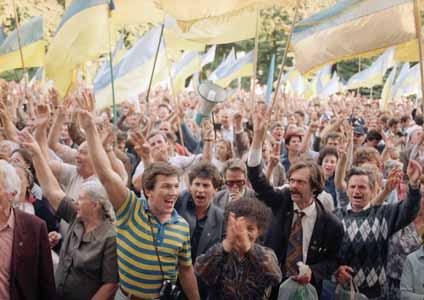
of national identity; a country with values which are very common to the European values; a country which values not only independence, but democracy. It is a democratic country, with all the problems that entails.
It is a country that stopped hesitating between Moscow and the West. This is a country which defined itself definitively to be a full-fledged Member of the European Union and of NATO. The level of support from society of this foreign policy is impressive – more than 80%, sometimes 90%. This was never the case before. I remember in the 2000s, the level of support was around 30%. Ukraine is a nation which re-discovered its identity, and which is consolidated with a common objective and common value. And this common objective is victory against the aggressor state. And, for us, this is a very highly valued objective, to punish the aggressor. I see this as a historic mission of Ukraine, and we are aware that we are not only defending ourselves: we are defending the whole democratic world and the countries of Europe from the Russian threat.
Since the early 90s, we had no expec-
We understood Russia would not tolerate the existence of an independent, democratic Ukraine, of a prosperous Ukraine being an inseparable part of the democratic world. And we witnessed, from the very beginning of 90s, attempts from Russia to try to create problems in Crimea. It was immediately after independence was restored, on August 24, 1991, that we heard from the Russian spokesperson of President Yeltsin that Ukraine should not dream of things like the inviolability of state borders. It was a message to Ukraine that it is not going to be tolerated in the borders of 1991. And we felt the tension in Crimea. And then there were subversive activities by Russian security forces. Our leadership took a very effective, to my thinking, measures against these subversive activities; we managed to establish a special status for Crimea and got rid of the so called self-proclaimed president of Crimea, Meshkov. As a result, we established a more or less stable status quo.
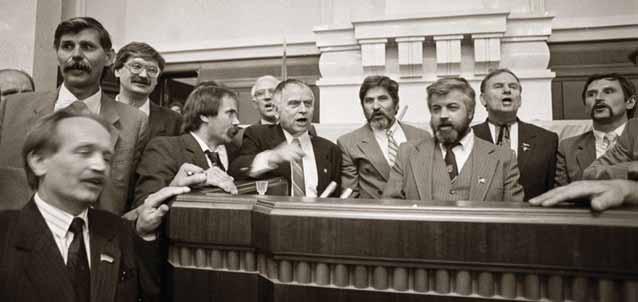
At the same time, I felt it from the very beginning that it was a mistake on the part of Ukraine to agree to basic rights for the Russian Black Sea Fleet on Ukrainian territories, especially in Sevastopol. From my point of view, this was a time bomb for Ukraine- the existence and presence of Russian military on the territory of Crimea.
And finally, we witnessed that the subversive activity and the war of aggression started in Crimea, where 1000s of Russian soldiers were stationed. Of course, at that time, there were mistakes on the part of the political leadership of Ukraine. But this is another story. The time bomb finally exploded in 2013, and the time was chosen to seize Crimea after the revolution of dignity, which was a victory of democracy in Ukraine. Now we understand that their objective was not just Crimea, but entire Ukraine- February 24, 2022 proved it. I remember, back in the 90s, one Russian politician saying that Russia will continue to try and impose control on Ukraine. That’s what
The beginning of the 90s demonstrated that the major preoccupation of Washington was the denuclearization of Ukraine. And this was, in fact, one of the conditions for Ukraine to be recognized as an independent state by Washington. So at the beginning of the 90s, we happened to be confronting two major big powers in conversations on Ukraine. We had no allies, we had no friends on the issue of nuclear weapons. Washington and Moscow were together pressing Ukraine to get rid of their nuclear weap-
AS A DIPLOMAT, DO YOU BELIEVE IN THIS WAR ENDING THROUGH DIPLOMATIC EFFORTS, THROUGH CUTTING A DEAL OF SORTS WITH PUTIN? WHAT WOULD THAT ENTAIL AND WHAT WOULD IT MEAN FOR UKRAINE?
I do not believe that we can reach any solution with Putin. As long Putin is in power, it will be impossible to reach a solution. For us, the only solution is to return to the borders of 1991. This is the only way forward. Is Putin ready to agree to this condition? No, he is not, other-
ons. And this was one of the major conditions for both Washington and Russia to have normal relations with Ukraine: their strategic geopolitical objectives coincided. We were alone and we had to make a choice. And our choice was definitely not Moscow, but Washington. So from my point of view, the question mark for Ukraine was either we keep independence, real independence from Russia, or we keep nuclear weapons and be dependent on Russia. We had no capacity to service nuclear weapons- all services were in Russia, all the lines of communication concerning the control of nuclear missiles on our territory were in Moscow. The choice was to have the United States as our friend without nuclear weapons, or keep insisting on having nuclear weapons on our territory, not controlling it, and being dependent on Russia’s crazy will. And with that came the risk of Ukraine being a target for a possible nuclear strike. It was a nobrainer.
FORMER DEPUTY NATO SECRETARY GENERAL ROSE GOETTEMOELLER, WHO WAS ALSO INVOLVED IN THOSE NEGOTIATIONS, SAID THAT “THOUGH THE RUSSIAN AND UKRAINIAN VERSIONS OF THE AGREEMENT SAID ‘GARANTII,’ THE ENGLISH SAID ‘ASSURANCES,’ AND ALL SIDES CAME TO THE SAME UNDERSTANDING THAT THERE WERE NO GUARANTEES.”
The US from the very beginning said that they would not be able to persuade Congress to sign a legally binding document. From the beginning they were against such a document. So in this case, we faced the demand from the Ukrainian parliament for “guarantees”. That's why we kept on insisting on the word “guarantees,” and a kind of compromise was reached that in the Ukrainian and
wise, he is going to lose power. The only way to reach our objective, to return to the borders of 91, is through military means. Diplomatic efforts with Putin did not work and are futile.
WHAT WOULD YOU TELL THOSE, AND THERE ARE QUITE A FEW OF THEM IN THE WORLD, WHO CLAIM THAT UKRAINE WILL NOT WIN ON THE BATTLEFIELD, AND ITS BEST CHANCE FOR PEACE IS TO CEDE SOME LAND IN EXCHANGE?
They have to understand that for Russia, it will only be a break from the war, giving them time to accumulate more forces and continue their aggression. Russia understands only force, only power. So the only solution is for Russia to either withdraw from our territory or to continue fighting. We do not consider it wise to agree on a temporary ceasefire or to allow Russians to keep the territories they’ve seized, it’s not acceptable to us, to the Ukrainian people. We have to liberate all our territory, whether it is done voluntarily by the Russians or whether it is done with the strength of our armed forces. Without this, there will be no peace. A ceasefire will only lead to Russia’s preparing for another war. We have to defuse the grenade, so to speak, and that means making Russians understand that it there is no way for them to get control of Ukraine by military means.
Ambassador Borys Tarasyuk is a Ukrainian diplomat and politician, twice Minister for Foreign Affairs of Ukraine in five governments under two Presidents (1998-2000, 20052007), and is Vice-President of the EURONEST Parliamentary Assembly. He ahs been a Member of the Verkhovna Rada (Parliament) of Ukraine since 2002, Deputy Chairman of the Parliamentary Committee on Foreign Affairs since 2014 and headed the Parliamentary Committee for European Integration (20022005, 2006 and 2007-2012).
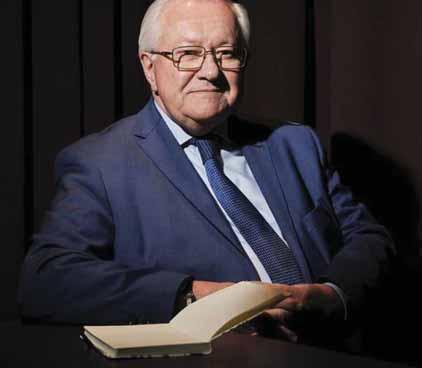
As long Putin is in power, it will be impossible to reach a solutionUkraine’s Permanent Representative at the Council of Europe, Amb. Borys Tarasyuk. Source: RFE
Similar to most of Russia’s immediate neighbors which enjoy close ties with Moscow, Serbia benefited economically from the Western sanctions imposed on Russia in the wake of the outbreak of the war in Ukraine in 2022. Numerous Russian businesses relocated to Serbia, and as a result of Moscow’s efforts to re-orient trade from the West, bilateral commercial and energy relations with Belgrade expanded.
The two countries have traditionally had close historic ties. Following February 2022, Serbia refused to impose sanctions on Russia, despite explicit calls from Brussels to do so. The two countries maintain close military cooperation and support each other on various international forums.
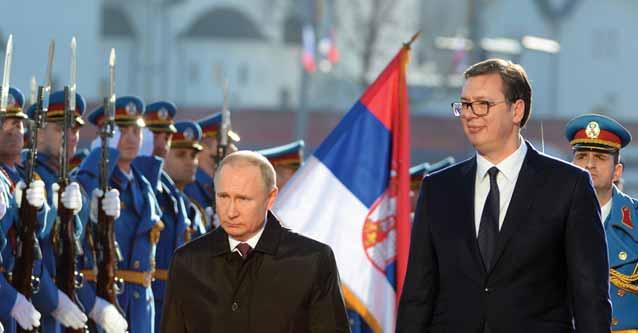
For Russia, the relations with Serbia remain a cornerstone of Moscow’s Balkan foreign policy. It allows Russia to project its influence toward the Mediterranean and undermine the EU’s position. Built on historically close ties from before World War I, Serbia and Russia see each other as close partners. Yet, Belgrade is balancing between Moscow and the West. It is unlikely to sacrifice its relations with the EU and is rather cleverly using the Russian card to advance its interests. Serbia wants to build a multialigned foreign policy whereby there will be no major fixation on any single actor. It essentially pursues what is increasingly visible in the Middle East
where Turkey, UAE and Saudi Arabia are trying to build closer links with as many big actors as possible.
Therefore, for Serbia, the links with the EU will remain of paramount importance. Indeed, economic ties push Belgrade to seek integration into the Union whereas trade and investment relations with Russia are not as significant as it might seem. For instance, commercial ties between Russia and Serbia have been steadily growing over the past several years, and in 2022 grew by 53%, or by $1.5 billion, amounting to $4.28 billion. This is nearly $1 billion more than what was registered in 2021 and is the highest recorded volume since 2008. Among Serbia’s five largest trading partners, trade with Russia has grown the most. At the same time, the growth of Russian exports to Serbia in 2022 was even higher – 70%.
Yet Russia is not Serbia’s biggest trading partner. In the period of JanuaryNovember 2022, the biggest partner was the European Union: exports to the EU countries amounted to almost $17 billion, imports – almost $20 billion. Trade with the entire EU accounts for 59% of Serbia's overall trade. Among individual countries, Germany was the biggest trade partner with a trade turnover of $7.9 billion. During 2022, the cumulative exports from Serbia amounted to $29 billion. Russia had a share of only 4.11%, equaling $1.19 billion.
For Russian investors in Serbia, favorable conditions exist, such as exemption for 10 years from paying income tax for large investments, and for 5 years for investments in selected regions of Ser-
bia. A tax credit is provided for fixed assets, reaching up to 80% of the total amount of cash investments. Moreover, imported Russian equipment is not subject to customs duties.
Overall, as of December 2022, Serbia has been able to receive almost $5 billion in foreign direct investment, which is nearly $1 billion more than in 2021. Except for trade in the energy sector, Russia's role in the Serbian economy is less visible, as Russian investment accounted for only 4.5% of total foreign investment between 2010 and 2020.
Following the war in Ukraine, through-
In the January-July period of 2023, Georgia witnessed notable upticks in the import of liquefied petroleum gas (LPG) and petroleum bitumen. The data from the Union of Petroleum Products Importers reveals that 31.50 thousand tons of LPG were imported, reflecting a substantial increase of 44.2% compared to the correspond-
ing period in the previous year. The data also highlights that an overwhelming 99.6% of the imported liquefied gases originated from Russia.
Concerning petroleum bitumen imports, the volume reached 61.1 thousand tons during the seven-month duration, marking a growth of 22.2% in comparison to the previous year.
Breaking down the sources of petroleum bitumen imports:
– Russia accounted for 27.1 thousand tons (44.4% of total imports)
out 2022, almost 200,000 Russians moved to Serbia. Russians established 2321 small companies, while in 2021 their number was only 158. The main cities where the Russian-speaking communities have been formed are Belgrade and Novi Sad.
In the longer run, Serbia will continue to abstain from imposing sanctions on Moscow. Reasons vary, but the pragmatic approach dictates that such a decision would be a painful blow not so much for Russian business, but for the energy sector of Serbia itself. The country might face unprecedented crisis, as the gas transportation system and the operation
of some power plants could be suspended. The fuel retail industry too will be impacted, and Russian analysts and politicians believe that it would further weaken Serbia’s position vis-à-vis Brussels, making the latter more vulnerable in negotiations over the future of Kosovo. Nevertheless, Serbia will pusue its multialigned foreign policy where its relations with the EU will occupy an important place.
Emil Avdaliani is a professor at European University and the Director of Middle East Studies at the Georgian think-tank, Geocase.
– Iraq – 19.4 thousand tons (31.7%)
– Turkey – 13.1 thousand tons (21.4%)
– Azerbaijan – 1.4 thousand tons (2.3%)
– Turkmenistan – 0.1 thousand tons (0.2%)
These figures indicate a substantial surge in the import of both LPG and petroleum bitumen in Georgia during the specified period. The increase in LPG imports can be largely attributed to the intensified purchases from Russia, while the import of petroleum bitumen also displayed notable growth.

The National Competition Agency of Georgia has completed the investigation of five economic agents in the motor fuel market. The issue concerns the maintenance of high prices in the retail market of motor fuel in the period March-August 2022, as a result of coordinated action.
As the National Competition Agency explains, as a result of the investigation conducted by the agency, it was confirmed that – LLC “Lukoil-Georgia”, JSC
“Visol Petroleum Georgia”, LLC “San Petroleum Georgia”, LLC “SOCAR Georgia Petroleum” and LLC
“Rompetrol Georgia” violated Article 7 of the Law of Georgia “On Competition”. In particular, it concerns directly or indirectly determining the purchase or sale price or other trading conditions.
“According to the agency’s assessment, during the period
under review, in the case of specific companies, non-European fuel with a lower cost compared to European fuel was available, and in some cases, a specific company/companies sold European fuel with a low cost only on the wholesale market, including to competing companies. In both cases (European and non-European fuel), there was a lack of competitive advantage derived from fuel cost. As a result, a high price was maintained in the retail market of motor fuel, which, according to the agency’s decision, was the result of the coordinated action of the 5 companies. According to
the decision of the agency, the appropriate financial sanction was imposed on five economic agents – up to 4 million GEL in total. Namely: “San Petroleum Georgia” LLC – 1,073,998 GEL; “Rompetrol Georgia” LLC – 987,886 GEL; “SOCAR Georgia Petroleum” LLC –719,310 GEL; JSC “Visol Petroleum Georgia” – 693,576 GEL; “Lukoil Georgia” LLC – 450,590 GEL. Also, in order to improve the competitive environment in the market, a necessary recommendation was given, which implies – the introduction of procedural mechanisms necessary for more effective control of the accuracy of fuel filling. In accordance with the legislation, companies can appeal the agency’s decision to the Tbilisi City Court. Due to the high public interest and the strategic importance of the market, the agency continues to monitor the market of motor fuel (gasoline, diesel). The evaluation period of the agency covers the period of January-August 2022,” reads the statement.
The Agency for Providing IDPs, Eco-Migrants, and Sources of Livelihood has commenced the acceptance of applications as part of the State Program of Reintegration Assistance for Returned Migrants to Georgia.
As outlined by the Ministry of Health, the program’s objective is to aid the reintegration process of Georgian citizens who are returning from emigration. The program aims to foster income generation, employment, and self-employment by providing funding for approximately 100 projects. The application process occurs in two stages each year,
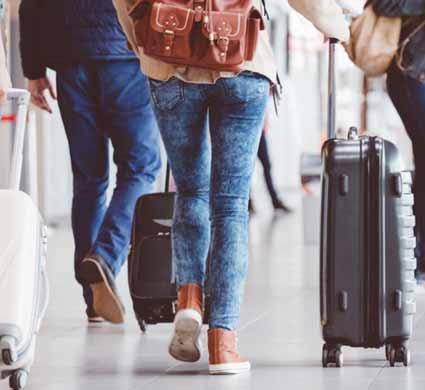
with grants being awarded to a total of up to 200 migrants.
“Returned migrants will select the inventory, equipment, and tools necessary for initiating or expanding their own businesses.
Citizens of Georgia (or stateless individuals with permanent residency rights in Georgia) are eligible to participate in the program if they have engaged in illegal residence abroad for over a year, have sought asylum, or have been granted asylum and have returned to their homeland within the past 12 months,” explained the Ministry of Health.
The acceptance of applications at the Agency and its territorial branches will be ongoing until September 12. Alternatively, applicants can also submit their applications to the agency’s designated email address: info@idp.gov.ge.
In the first half of 2023, the recovery in the number of international visits continued, however at a slower pace compared to previous periods, which could be attributed to the ongoing Russia-Ukraine War and related continuous disruptions in Georgia’s tourism sector due to ecological and geo-political issues arising from it. In particular, in the first half of 2023, the number of international visits reached 2.5 million visits, which is equal
corresponding figure for the first half of 2019), Kazakhstan (73.6%), and Israel (38.1%). Meanwhile, the recovery was the lowest for Azerbaijan (13.5% of the corresponding pre-pandemic number), Armenia (74.8%), and Iran (83.0%).
Notably, looking at the situation from a regional perspective, in the first half of 2023 the number of international visits originating from Europe was considerably below the pre-pandemic figure (-23.3%), while from all other regions,
can be attributed to factors such as increased average length of stay, the broader recovery of international tourism, and inflationary trends. In particular, in the first half of 2023, income from international travel reached USD 1.8 billion, which is 24% higher compared to the first half of 2019, and 58% higher compared to the first half of 2022. In terms of nationality, income from Russian travelers was highest in the first half of 2023 (26.7% of total income from international travel) and amounted to USD 482.1 million, which is 9.4% higher compared to 2019. In this regard, Russia was followed by Turkey (14.6% of total income), income from which recorded a 39.5% increase compared to the first half of 2019, and then the EU, which surpassed the pre-pandemic number by 14.4% despite the low level of recovery of international visits and contributed 12.0% of total income from international travel.
Among the top 10 countries of origin, the income recovery rate was the lowest for Azerbaijan (recovering to just 59.3% of its pre-pandemic figure). Meanwhile, a significant increase in income compared to the pre-pandemic period was reported for Israel (70.4%), while Ukraine also recorded a reasonable rise (30.8%).
According to the National Bank of Georgia, as of 30 June 2023, 38.4% of Russian citizens, 34.9% of Belarusian citizens, and 28.0% of Ukrainian citizens residing in Georgia were estimated to have been living in the country for one year or intending to stay for more than one year. According to IMF methodology, such people are treated as Georgian residents, and their spending is not included in the calculations of income from international travel.
to 78.3% of the corresponding pre-pandemic (2019) number. However, this did at least represent a significant YoY increase (75.7%).
In the first half of 2023, in terms of country of origin, the highest number of visitors to Georgia came from Turkey, amounting to 582,500, marking a 16.6% rise compared to the first half of 2019.
Narrowly behind in second was Russia with 577,600 visits, reflecting a 16.5% drop compared to the pre-pandemic number. Among the top 10 countries of origin for international visitor trips, the number of visits increased most from Belarus (127.0% higher compared to the
the number of visits reached or exceeded the pre-pandemic number. This could be attributed to Georgia perceived as less safe or suitable as a tourist location due to the Russia-Ukraine War, and consequent disruptions, such as the substantial inflow of migrants from Russia.
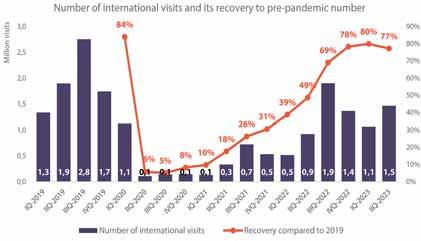
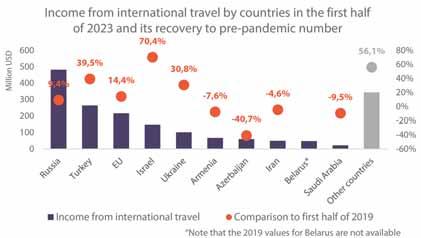
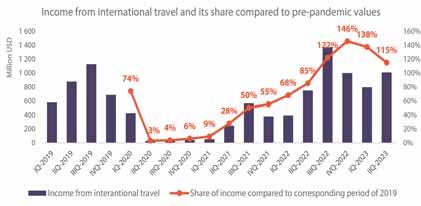
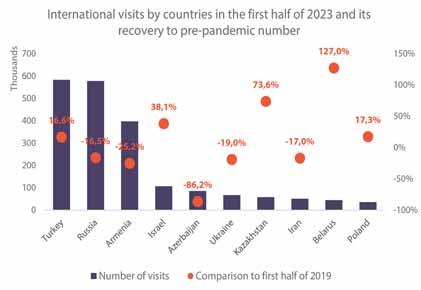
Despite only a partial recovery in the number of international visitors in the first half of 2023, the income from international travel in this period exceeded the pre-pandemic level significantly. This
In Georgia, the average cost of a room in a 3-star hotel was 174 GEL per night in July 2023, while the average cost of a room in a 4-star hotel in Georgia was 267 GEL per night and the average cost of a room in a guesthouse was 132 GEL per night.
The average cost of a room in a 5-star hotel in Georgia in July 2023 was 498 GEL per night. In Guria, the average price was 894 GEL, followed by Adjara – 550 GEL, Tbilisi – 505 GEL, and Kakheti – 466 GEL.
In July 2023, in Georgia the hotel price index increased by 0.6% compared to June 2023. The 3-star, 4-star, and 5-star hotel price index increased by 1.6%, while for guesthouses, the price index decreased by 8.7%. The monthly HPI was the highest in Guria (16.3%) and lowest in Mtskheta-Mtianeti (-11.9%).

In July 2023, compared to July 2022, hotel prices in Georgia decreased by 8.6%. The prices of 3*, 4*, 5* hotels decreased by 10.2% and the prices of guesthouses decreased by 10.4%. The yearly HPI was the highest in Shida Kartli (19.8%) and lowest in Tbilisi (-16.5%).
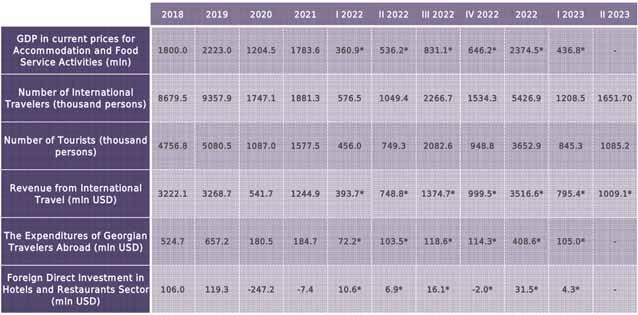
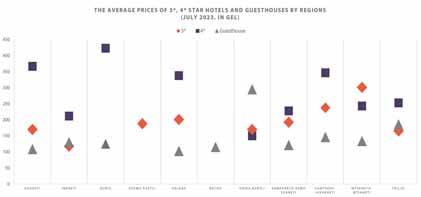
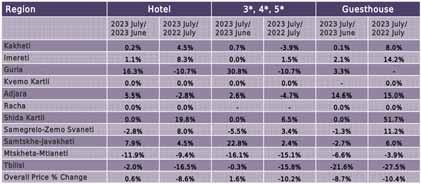

Welcome to the fourth Real Estate article by Legal Columnist Daniel Klein. We've received numerous inquiries from readers regarding the viability of purchasing an investment property for returns. Notably, Georgia offers higher returns on apartment investments compared to many Western European destinations. However, it's important to acknowledge the elevated country risk associated with such investments.
Regarding the impressive returns, Tbilisi boasts an investment yield of over 10%, with returns exceeding 12% outside the city center. In stark contrast, Paris yields just above 2%, and Barcelona falls short of 5%. An intriguing option, Wyndham Grand Residences Batumi Gonio (wyndhamgrandbatumigonio.com), appears to promise up to 24% returns for residential investments in Batumi. It's worth noting that the high risk perception of Georgia is arguably offset by the alluring rewards it offers.
NO TRANSFER TAXES
Unlike many countries where transfer taxes exceed 5% in places like Paris and a minimum of 10% in Barcelona, Georgia has yet to adopt the concept of transfer taxes. Typically, these taxes are implemented to temper housing markets fueled by foreign investments, which can inflate prices to the detriment of local affordability and rental rates.
CAPITAL GAINS TAX: 5% OR 0%
In Georgia, if a property is sold within two years, a 5% capital gains tax is applicable; however, if the property is held for over two years, this tax drops to 0%. In comparison, France and Spain impose capital gains taxes ranging from 19% to 24%.
Property taxes in Georgia max out at 0.8% depending on income bracket. Barcelona is higher with 1.1% taxes. By con-
trast Paris taxes property at 0.2% making Georgia expensive, at least compared to Paris.
Considering our prior discussion on Georgia's tenant-friendly environment (See Legal Insights with Klein Law: Georgia for Digital Nomads - Ease of Renting a Flat and Opening a Bank Account), it's important to note that Georgia might not be the most favorable place to be a landlord. However, if the intention is to utilize the apartment for
Airbnb purposes, Georgia's lenient regulations come into play. These regulations are attributed partly to the abundance of hotels and the relatively lesser demand for short-term rentals compared to popular Western destinations. It's worth mentioning that certain cities tightly regulate Airbnb, imposing limitations, such as a cap on the number of days an apartment can be rented per year (e.g., 120 days). Furthermore, excessive regulations and associated costs can diminish the economic attractiveness of short-term rentals in some locations. Due to its seasonal nature, short-term
Giorgi Todua, the executive director of the Nut Producers’ Association in Georgia, has shared valuable insights about the upcoming nut market trends. He anticipates that by the end of August and the beginning of September, the price for high-quality nuts will likely range between 6 and 7 Georgian Lari (GEL) per kilogram. He expects the price for lower-quality nuts to be around 3 to 4 GEL per kilogram.
Todua pointed out that Turkey holds a significant stake in the global nut market, supplying 70-75% of the world’s nuts. This prominent role gives Turkey the power to influence nut prices worldwide. Notably, Turkey is preparing for a normal hazelnut harvest this year, which will contribute to the pricing dynamics.
The executive director revealed that Turkey is set to announce its official nut prices shortly, which will provide more accurate insights into the pricing situation in Georgia.
Todua advised farmers who have applied appropriate agricultural practices and
Source: business formula
are expecting a bountiful harvest to expedite the harvesting process and ensure timely drying to prevent spoilage. He further recommended that those with high-quality harvests hold off on selling their nuts for the time being, suggesting that waiting for the Turkish price announcement could be beneficial. He identified the prime window for selling quality nuts as the end of August through September.
With Turkey’s average nut yield typically at 50%, Todua calculated that the difference between Turkish and Georgian prices would be approximately 1 to 1.5 GEL.
He also highlighted the positive trend in Georgia’s hazelnut production. Compared to the previous year, the country has witnessed a 30% increase in yield and a notable improvement in quality. In 2022, Georgia’s hazelnut production totaled 40,000 tons, with 80% falling into the low-quality category. However, the outlook for the current year is optimistic, with an expected harvest of at least 50,000 tons. It’s anticipated that around 70% of this harvest will consist of premium and top-quality nuts. Only 10% of the harvest has been completed so far.

For more insight, refer to our articles: Legal Insights with Klein Law: Buying a Secondhand Flat in Georgia and Legal Insights with Klein Law: Buying a Flat in an Unfinished Residential Development in Georgia. Whether engaging a broker or conducting an independent search, it's advisable to conduct both a swift legal review and a thorough market reputation assessment.

In most cases, property owners without an income in Georgia won't have access to mortgages. This sets Georgia apart and might be considered a drawback, as this is not the norm in many other countries.
Georgia's business landscape and personal safety have evolved significantly. While the 1990s and subsequent years were marked by some chaos and a lessthan-favorable reputation for Georgian businessmen, a new generation has emerged, characterized by high integrity. The real estate market appears to be relatively free from scams, a crucial aspect when considering investment opportunities. Furthermore, both expats and locals widely agree that Georgia is exceptionally safe, allowing individuals to navigate virtually any neighborhood at any time without concerns of muggings or security threats.
rentals might not provide consistent year-round income in Georgia.
When working through a broker, investors should consider the possibility of the broker receiving commissions from sellers, potentially leading them to favor projects or apartments that offer higher commissions. This introduces a conflict of interest, making it important for buyers to exercise caution if a broker seems excessively focused on certain offerings. Seeking a second opinion from another real estate professional might be prudent.
According to the investigation service, two individuals who marketed hazardous chocolate are facing charges.
An inquiry established that the accused attached stickers indicating a new expiration date to expired chocolates with various brand names of foreign origin, and subsequently marketed them within the Tbilisi shopping network. Following investigative measures, a substantial quantity of expired chocolate,

sold by the defendants and containing microorganisms dangerous to human health, was confiscated from the retail premises. Moreover, it was ascertained that the defendants, by falsifying information on the customs declaration, had brought undeclared food products worth 85,000 GEL into Georgia, using a truck, via the customs checkpoint. These items were also apprehended as a result of the investigation and reported to the Ministry of Finance’s investigative service. The agency notes the actions are covered by Articles 198 and 214 of the Criminal Code of Georgia, which prescribe a prison sentence ranging from 8 to 11 years.
Source: Business Formula
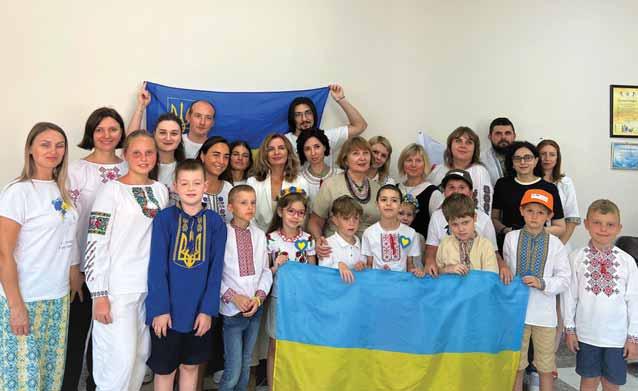
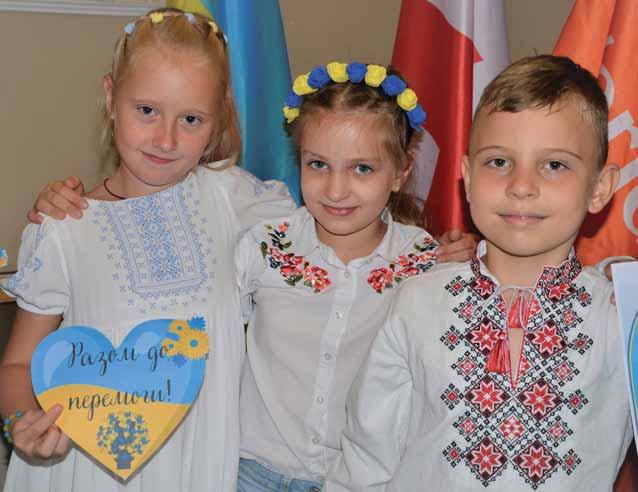
On August 23, World Vision Georgia hosted a special event for children to commemorate Ukraine's Independence Day and the National Flag Day of Ukraine. The significance of Independence Day, marked on August 24, and Flag Day, celebrated on August 23, was highlighted through an exhibition of artworks created by talented Ukrainian children. Citizens of Ukraine living in Georgia, their children, and representatives of the Embassy of Ukraine, gathered to mark this important day and celebrate their shared heritage and culture together. The celebration was filled with joy and a sense of unity, while the collective singing of the Ukrainian anthem amplified the atmosphere, evoking a strong and patriotic sentiment among all- children and adults.
A whole week was spent in Happy Space, the World Vision Education and Development Center, seeing children enthusiastically engaged in artistic endeavors, crafting diverse artworks centered around the theme of Ukraine. Additionally, special classes were conducted, providing children with a deeper understanding of the symbolism behind the Ukrainian flag. Alongside this, they had the opportunity to immerse themselves in the Ukrainian language, learning rhymes that further connect them to the country's rich heritage.
The event was attended by Tetiana Kolotylova, the First Secretary of the Embassy of Ukraine in Georgia, who spoke about the significance of the celebration. During her speech, she also expressed her appreciation to World Vision for their efforts in providing assistance and support to Ukrainian families who have been displaced due to the war. “Today, we have come together to mark a remarkable occasion - the National Flag Day of Ukraine. This flag holds a special place in our hearts, and its significance is enshrined in the Constitution of Ukraine,” Kolotylova noted.
“I am currently holding the Children's Constitution in my hands, created especially for Ukrainian children,” she went on. “Within this constitution lies the twentieth article, dedicated to explaining the symbolism behind the colors of the Ukrainian flag. The National Flag of Ukraine embodies not only our sky and our wheat, but also our entire country and homeland.
“I would like to highlight the significant role that the World Vision’s program has played in providing essential support to Ukrainian families currently residing in Georgia. World Vision has gone above and beyond by establishing a space known as the Happy Space, a special area of peace and comfort for children and families. This space offers a supportive environment for Ukrainian children and parents, helping them to adapt to the new environment. Children can partake in various activities, learn, play, and grow. Furthermore, the availability of psychological support sessions is also invaluable. We extend our heartfelt gratitude to World Vision, hoping that this program will continue to thrive in the coming
World Vision Georgia has supported through various means
24,250 Ukrainian people living in Georgia
years,” the First Secretary concluded.
“I would like to extend my warm congratulations to the Ukrainian people on the occasion of the National Flag and Independence Day of Ukraine,” said Ekaterine Todria of World Vision. “Our dedicated team behind the World Vision program has been tirelessly working to provide comprehensive aid to Ukrainian children and their families. We are currently underway with the second phase of the Ukraine Crisis Response program, which, along with financial and material support, delivers psycho-social and educational services tailored to provide extensive assistance to those affected, addressing not only their immediate needs but also recognizing the importance of their emotional well-being and adaptation.
“Events like the one we are partaking in today are regular occurrences, each carrying a cultural or social significance.
World Vision events allow Ukrainian citizens to come together, fostering a sense of belonging and comfort, akin to being at home,” Todria finished, wishing the Ukrainian citizens peace and a dignified return to their homeland.
World Vision started to respond to the emerging needs of the Ukrainian people from the very onset of the crisis by scaling up operations in Romania, followed by humanitarian programming in Georgia, Moldova, and inside Ukraine. Initially, the World Vision Georgia office responded to the basic needs by providing food and sanitation kits, clothes, and other essentials to the Ukrainian families and children displaced by the war. Within the frames of the Ukraine Crisis Response Program, individuals affected by the war benefited from various methods of support, including cash and financial assistance; winterization vouchers enabling parents to purchase warm clothes for children; mental health and psycho-social support services for children and women; access to education, health, and other services. As the situation evolved, assistance was diversified through various development programs in Georgia to support and empower Ukrainian families and their children.
The organization runs Happy Space centers both in Tbilisi and Batumi, hosting various non-formal child-oriented activities; psycho-social services for
people of all ages; Positive Parenting training; Ukrainian, English, and Georgian language courses, and catch-up classes for Ukrainian children and adults. All these services are aimed at helping children and their parents overcome the stress they have been through and adapt to their new surroundings. The organization, in cooperation with the United Nations High Commission for Refugees (UNHCR), also manages a Multi-Service Center dedicated to supporting refugees from various countries, including Ukraine. Its primary function is to assist refugees in their resettlement, employment, and integration process.
One Ukrainian mother, Hanna Bohatyrenko, whose family regularly benefits from Happy Space services, was present at the event this week and took the opportunity to share her personal journey and experiences.
"I came to Georgia from Ukraine with my daughter. It's been exactly one year since we started our new life here. During that time, I got to know about the World Vision organization. I heard about their program that offers free events for Ukrainian children, and that really caught
my attention. The events organized by World Vision are not only interesting but also incredibly valuable. From psychotherapy to music therapy and various other engaging activities, they provide a holistic experience. Now, my daughter attends Georgian and English language classes, free lessons which play a vital role in the development of Ukrainian children. Additionally, there's a wonderful Women's Club that takes place every week, creating a supportive community for Ukrainian women in the country.
“This organization has been a lifeline for Ukrainian families like ours. The aid they provide has made a significant impact, especially for those of us who arrived in Georgia with very few possessions. In the face of challenges, we hold onto the hope for triumph and a brighter future. Just as our Ukraine has shown resilience, we believe that by standing united, we can overcome anything,” Hanna told us.
World Vision Georgia frequently hosts international guests from different regions and support offices of World Vision. Recently, Chris Palusky, the Response Director of the Ukraine Crisis Program, encompassing Ukraine, Romania, Georgia, and Moldova, visited the World Vision office in Georgia to oversee the program’s activities and learn about the results and its impact on Ukrainian refugees in the country. Palusky met with the staff, local and international partners, and state authorities and interacted with those who have been benefiting from World Vision’s work. The Director gave a highly positive evaluation of the work and reaffirmed the commitment to ongoing support.
World Vision provides continued support to Ukrainian citizens living in Georgia within its Ukraine Crisis Response Program, with the financial support of Aktion Deutschland Hilft (ADH) and UNHCR, in cooperation with local as well as international actors. At present, financial and cash assistance has been provided to 9950 beneficiaries. More than 1700 individuals, including children, have benefited from Psycho-Social Support sessions, while educational resources and non-formal courses offered by World Vision Georgia have covered more than 1000 children and adults. In total, the program has supported 24,250 Ukrainians in the country through diverse services and assistance.
As part of the celebration, World Vision Georgia will also join the event dedicated to Ukraine's Independence Day, organized by the Embassy of Ukraine in Georgia. A symbolic marathon, paying tribute to the memory of fallen soldiers from both Ukraine and Georgia, who have bravely served, will take place at the setting of Lisi Lake. The event is scheduled for 11am on August 26. World Vision Georgia will set up a children’s corner at Lisi Lake, where kids can engage in different games and have fun.
World Vision Georgia has been a lifeline for Ukrainian families like ours
report. Extreme poverty is defined as living on less than $2.15 a day, based on 2017 prices and adjusted for purchasing power and inflation.
“Asia and the Pacific is steadily recovering from the COVID-19 pandemic, but the increased cost-of-living crisis is undermining progress toward eliminating poverty,” said ADB Chief Economist Albert Park. “By strengthening social safety nets for the poor and fostering investment and innovation that creates opportunities for growth and employment, governments in the region can get back on track.”
Poor people have been hurt the most by the increased cost-of-living crisis, as they are less able to pay higher prices for necessities such as food and fuel.
Increases in the price of basic goods and services leave many poor people unable to save money, pay for health care, or invest in education and other opportunities that can improve their condition in the longer term. Women may have also been disproportionately affected, as they tend to earn less than men while also being subject to unpaid work.
health hazards, increasing their health care costs, and they may have longer and less convenient commutes.
ADB estimated in 2021 that the pandemic had pushed an additional 75 million to 80 million people into extreme poverty as of the previous year, compared with pre-pandemic projections. Extreme poverty was then defined as living on less than $1.90 a day based on 2011 prices.
Economies in developing Asia and the Pacific are projected to continue making progress against poverty. Nonetheless, by 2030, an estimated 30.3% of the region’s population—or about 1.26 billion people—will still be considered economically vulnerable, defined as living on $3.65 to $6.85 a day, based on 2017 prices.
The increased cost-of-living crisis sparked by surging inflation last year, combined with the lingering effects of the COVID-19 pandemic, is continuing to push people in Asia and
the Pacific into extreme poverty, according to a new report by the Asian Development Bank (ADB).
An estimated 155.2 million people in developing Asia and the Pacific, or 3.9% of the region’s population, lived in extreme
poverty as of last year, according to Key Indicators for Asia and the Pacific 2023, released this week. The number is 67.8 million greater than it would have been without the pandemic and the increased cost of living crisis, according to the

Not only do the poor earn less income, they also pay a premium to access many essential goods and services while being forced to make choices that can be more expensive in the long term, the report notes. For instance, low-income households often have to buy commodities in smaller quantities, which may be more expensive than buying in bulk. They may also be forced to live in informal settlements where they are exposed to greater
To help address the increased cost-ofliving crisis, governments in Asia and the Pacific can strengthen social protection systems, increase their support for agricultural development, improve people’s access to financial services, prioritize infrastructure investments, and promote technological innovation and human capital development, according to the report.
ADB is committed to achieving a prosperous, inclusive, resilient, and sustainable Asia and the Pacific, while sustaining its efforts to eradicate extreme poverty. Established in 1966, it is owned by 68 members—49 from the region. Data concerning Georgia specifically can be found here: file:///C:/Users/User/ Downloads/geo-key-indicators-2023.pdf
Continued from page 1
In particular, the World Program of Action for Youth to the Year 2000 and Beyond, which was adopted by the 50th plenary session of the General Assembly, repeated this in calling upon Member States to:
“…Include Youth Representatives in their national delegations to the General Assembly and other relevant United Nations meetings, thus enhancing and strengthening the channels of communication through the discussion of youthrelated issues, with a view to finding solutions to the problems confronting youth in the contemporary world.”
In 1995, the United Nations formally strengthened its commitment to young people by adopting the World Program of Action for Youth (WPAY). It provides a policy framework and practical guidelines for national action and international support to improve the situation of young people, and was expanded in 2007 to cover additional action areas relevant to youth. The framework’s priority action area on the full and effective participation of youth in the life of society and in decision-making invites “governments to strengthen the involvement of young people in international forums, inter alia, by considering the inclusion of youth representatives in their national delegations to the General Assembly.” (A/ RES/62/126)
Another resolution in 2004 reiterated this recommendation, but acceptance and implementation of these recommendations by Member States has been slow. In 2003, only five countries - Australia, Denmark, the Netherlands, Norway and Sweden - sent a youth representative as part of their delegation. Georgia joined the initiative only in 2012, when the first Representative of the Youth to the UN was chosen.
As the Representative of Youth, the delegate makes statements at UN HQ during official summits, forums and conferences. In Georgia, this also includes regional visits to facilitate communication with municipality youth centers. Roles and mandates are generally deter-
mined by the authority responsible for youth development in a country (in cooperation with the Ministry of Foreign Affairs (or its equivalent) and the permanent mission to the United Nations), and are usually decided in consultation with the national youth structure (i.e. National Youth Council). In Georgia, the Youth Representative to the UN is elected by a special commission with members from the UN Resident Coordinator in Georgia, the Ministry of Culture, Youth and Sport, Ministry of Internal Affairs, the Youth Agency of Georgia, the Youth Advisory Council, and counting a previous UN Youth Delegate.
The structure and term of an annual youth delegate program also differs between Member States. The potential for engagement is also shaped by the intergovernmental processes in which youth delegates participate. Historically, youth delegates participate in the General Assembly and functional commissions of the Economic and Social Council. In that context, they often provide input to their delegation on issues related to youth, or priority issues raised in national consultations prior to their engagement with the intergovernmental meeting. They can also participate in the delegation’s general work through attending a variety of meetings and informal negotiations, as well as providing assistance in covering general debates and drafting reports.
At the global level, the Department of Economic and Social Affairs (DESA) coordinates the participation of youth delegates. Member States therefore often inform the department‘s Division on Inclusive Social Development of the participation of youth delegates, so that information can be circulated to them and they can be connected with youth delegates of other countries. DESA’s work with youth delegates is in support of the Member States who have the responsibility to decide who will represent the young people of their country, and to select youth delegates (on an ad hoc basis) or to establish a youth delegate program at the national level.
Daviti Esatia became the United Nations Youth Delegate of Georgia in September 2022. He graduated school in Gali and became the first UN Representative Youth to cross the administrative boundary line to visit Abkhazia.
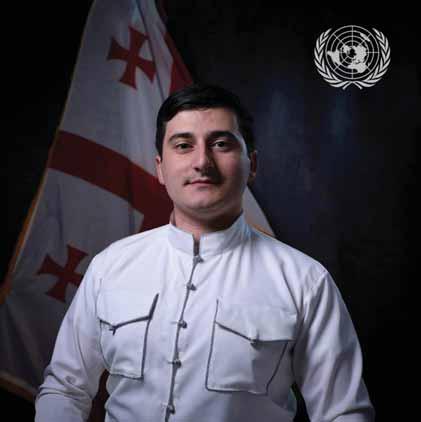
On September 29, 2022, within the framework of the 77th session of the UN General Assembly, at the General Discussion of the Third Committee, Esatia started his speech with an Abkhazian “Hello”, which was the first Abkhazian word ever spoken to the UN. In the Constitution of Georgia, the Abkhazian language is also an official state language alongside Georgian.
“Excellences, Distinguished Guests, Ladies and Gentlemen. First of all, I want to say hello in the Georgian and Abkhazian languages: Gamarjoba, Mshibzia.
“The United Nations provides each Member State a platform to voice concerns and share their views about the most pressing challenges and opportunities of our time.
“On behalf of the youth of Georgia, it is a great honor to speak here, at the UN.
“The adoption of the 2030 Agenda for Sustainable Development has been a truly transformative step towards the peaceful and secure world of clean environment, human rights, good governance, rule of law and economic progress.
“Years ago, when I lived in a small town - Gali, in a conflict affected area, I could not realize what the three letters ‘SDG’ meant. Apparently, it is indeed difficult to think about the future, or development, when you are in a challenging environment, where the UN Charter, fundamental principles and norms of international law are shamelessly violated. This is the context where human rights and basic freedoms are luxuries that the conflict-affected people sadly cannot afford. This very environment mentally cripples young people and deprives them of the basics, even their right to quality education.
“Today, the whole planet sees the results of the unprovoked, senseless war against Ukraine. It yet again reminds us of our duty to defend our values and to contribute to the establishment of lasting
peace and security. For this reason, it is essential to counter the aggressor with our strong stance and unwavering unity.
“In these volatile circumstances, like never before, my direct message to all young people is: Use all the opportunities that the world gives us. Be resilient! Have courage to take on challenges.
“Years ago, I could never even imagine that I would be applying for such an important position – youth delegate to the UN. But here I am. Of course, it is not easy to walk from ‘Gali to New York,’ but it is possible.
“I am sure that this little story of mine can become a good message and motivational example for all young people living in villages, cities, towns, mountains, or anywhere.
“Dear friends, I came here to say that our generation, to solve any issue, chooses not weapons, but dialogue. I am happy that we prefer negotiations and reconciliation. My generation must not make mistakes. Only together can we build a better world - our common future. And
sustainable development is exactly the plan, a hope for a better tomorrow, in which we will not be fearful to take steps and in which we will have the ability to choose our own destiny. The SDGs facilitate the opportunities to unify the youth on both sides of the dividing lines.
“According to the UN Secretary-General’s report ‘Our Common Agenda,’ the world currently has the largest young population in history: 1.8 billion. Many of these young people see their potential hindered. Establishment of the UN Youth Office gives hope that it will contribute to bringing their diverse voices into the UN system.
“Maybe it is out of our capability to solve all problems, but ‘It is better to light a candle than curse the darkness.’ I think with the active participation of young people, nothing is impossible. Because young people are not only our future but more importantly, we are the present. We can change, we can decide, and we can improve everyday life in our countries and beyond,” Esatia concluded.
They are driven straight to us for supper. After breakfast, they driver reappears and takes their big luggage to the next stop, leaving each person with a manageable day-pack for the hike. It works quite well.
Usually there are a few tweaks needed, such as what we call “dietary special needs”. Typically, there will be a vegetarian or two in such large groups. Less common but also possible is intolerance to gluten (the kind found in some grains, such as wheat) or any milk product. Very rare is a vegan diet, and in such groups so far we have not yet had halal (Muslim) or kosher (Jewish) requirements, although in other small parties, we have. We are ready for all, especially if we know what to expect in advance, as is usual.
BLOG BY TONY HANMERIt has been a busy few days for us at Hanmer Guest House in Etseri, Svaneti.
On August 19, we had two groups come for the same night, thankfully booked in advance so there was plenty of time to prepare. But they totaled 30 people, stretching our capacity actually past its limits. We had to send several
people to sleep at a neighbor’s house; although we took care of all their meals: supper, breakfast and a pack lunch as they set off hiking towards the hamlet of Mazeri at the top of Becho village the next morning.
One group was all from the Czech Republic, the other from Poland. Both came with companies who stop with us often in the summer, with the same idea. The people fly into Georgia, usually via Kutaisi, and are picked up there by private minivan, with their guide on hand.
I announced to the Czech group over supper that they were our first ever users of the new cafe we are building, to some applause, and took some photos. The facility is not yet quite finished, but we can still host overflow people there. Our helper-neighbor lady had already been working for several days to assist us in getting everything ready, and despite considerable stress from such numbers, it was.
The next morning, I took a few more photos of both groups getting ready to set off on their day’s trek to Mazeri, a relatively easy one before the big hike of the Gulf Pass to Mestia, about twice
as long. Both days feature Ushba in all his grandeur, which for me is a huge visual bonus.
Then, as the Czech group was nearly prepared, a group of several children from Mestia and another guide joined them, all with their own day-packs. This, too, was historic. These youngsters, down to about 10 years old, are learning the trails and the ropes of trekking and being a guide. They all speak English, and are impressively physically fit and full of energy.
Bless them! There is money, a career and a future, to be made in good trekguiding, and they are getting a head start. Etseri’s own young people and those from other villages on these trails would do well to watch and learn, and take part too. The right skill-set of language,
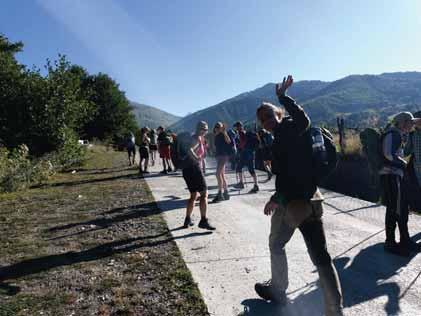

knowledge such as basic first aid, fitness and desire to make a living right here can take them far. The older, seasoned guides will not live forever (although I wish each of them a century more, as one does in Georgia!). Soon they must make way for these new ones, who from the look of them will step right up and fill their shoes. This gives me hope.
Tony Hanmer has lived in Georgia since 1999, in Svaneti since 2007, and been a weekly writer and photographer for GT since early 2011. He runs the “Svaneti Renaissance” Facebook group, now with over 2000 members, at www.facebook.com/groups/ SvanetiRenaissance/
He and his wife also run their own guest house in Etseri: www.facebook.com/hanmer.house.svaneti
It is with a heavy heart that we share the news of the untimely passing of Nick Beresford, Resident Representative of the United Nations Development Program (UNDP) in Georgia - the UNDP posted on social media Wednesday.
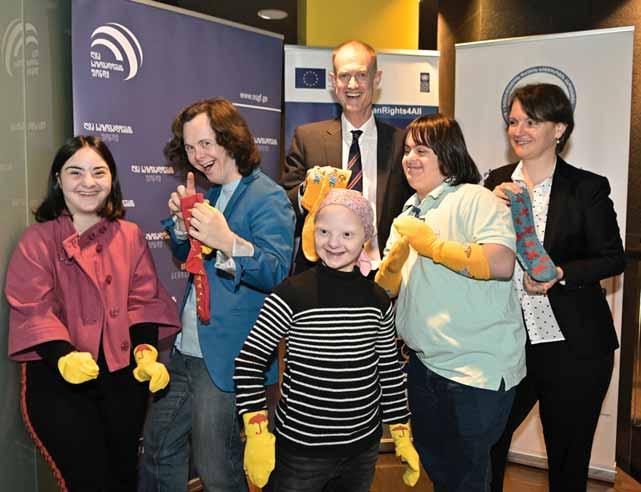
“We extend our deepest condolences to Nick’s family during this incredibly difficult time,” the message continued.
“Our thoughts are with his wife, Angela, their children, Anna and Kit, and all his many friends and admirers around the world. In this moment of grief, we stand by their side, offering our support and sharing in their sorrow.
“We are immensely grateful to the dedicated doctors and medical personnel at the Aleksander Aladashvili Clinic in Tbilisi, who fought tirelessly for Nick’s life.”
Nick Beresford will forever be warmly remembered in Georgia as an extraor-
dinary person who managed to combine consummate professionalism with a witty and self-deprecating sense of humor.
He was that rare person in UNDP who could claim qualifications at once as an auditor, an economist and a specialist in English literature – intertwining all these skills to deliver uniquely capable leadership.
“His unwavering commitment to upholding UN values for everyone everywhere made a profound impact on UNDP's work,” the UNDP announcement noted. “He was a resolute champion for human rights, deftly supporting the LGBTQI community in the most difficult of contexts. He believed in delivering tangible results to people in need, and he was happiest when visiting families and communities whose lives were transformed thanks to UNDP’s work.
“Throughout his two years in Georgia, Nick earned the trust and respect of all
who had the privilege of knowing him. His kindness and humility instantly won the hearts of the entire UNDP Georgia team.
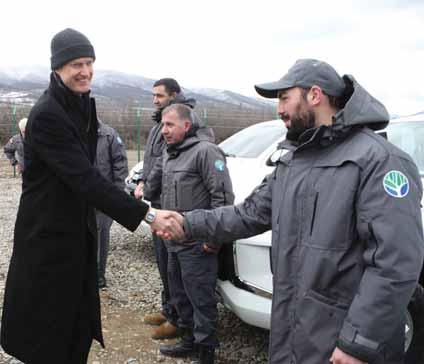
“The grief at his passing is global, extending from Tbilisi across the entire UNDP family to the many locations scattered across the globe where he served during his two decades of UN work: Cambodia, Bangladesh, Somalia, East Timor and New York. In life, Nick was a friend and role model to many; in death, may his legacy inspire us in our human
duty to love one another and our mission to create a better world for all.”
As we bid farewell to Nick Beresford, a book of condolences will be opened at the UN House in Tbilisi (9 R. Eristavi Street) from 10:00 to 18:00 on 24 and 25 August. This book will serve as a testament to the lasting impact he had on the lives of those he touched. Those who are unable to visit UN House are welcome to contribute to the e-version of the book: https://www.kudoboard.com/ boards/3Za0CZMj
GEORGIA TODAY has taken great pleasure sharing the wonderful work of the UNDP to make Georgia a stronger, better and more sustainable place in which to live, work and grow, and Nick Beresford's work has been pivotal to that process these past two years. We offer our condolences to his team, family and friends at this very difficult time.
UN House, 9 Eristavi St., Tbilisi 0179, Georgia; Tel: (995 32) 251126 Fax: (995 32) 250271 registry.ge@undp.org
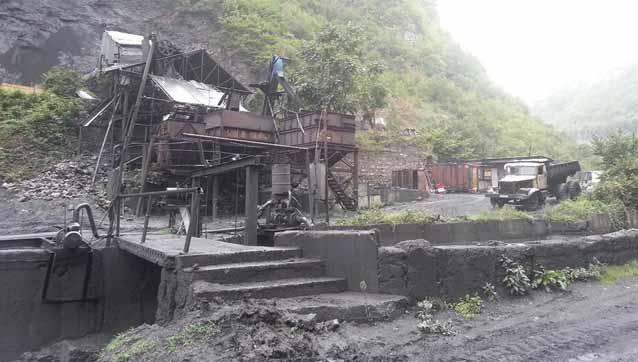
Folks, the summer reading continues! There are millions of museums around the world, and there are hundreds in Georgia, though, seemingly, it is not something we much bother ourselves with, having settled ourselves quite comfortably in the worldwide electronic museum-library called the internet. Yet, if history matters at all, museums as such carry huge humanistic value. No matter how big and important, or small and insignificant, they might be, they keep within their walls the wellorganized and ready-for-further-investigation details of our past that, someday, could be used with tremendous efficacy by the generations to come. Understandably, some people, especially the young, eschew dropping into a museum, seeing it as unsuited to their hunger for entertainment. There might be thousands of extremely interesting exhibits displayed on the floors and shelves of a museum, but they’re not really a showplace to have fun at, are they? However, museums need to be recognized as places that have accumulated thousands of years of valuable lore to teach us how to behave in the future.
It was a sheer accident just a fortnight
ago that I found myself in the Chiatura Manganese Mining History Museum.
Chiatura is a city in the Imereti region of western Georgia famed for its historical manganese ore mining. The museum is located right in the heart of downtown, at 9 Ninoshvili Street, in just three modest rooms on the fourth floor, but as soon as you enter this miniature shrine of knowledge, you know how to behave – thoughtfully, observingly, and with serious determination to extract the most out of it. The manager of this unlikely informational den, a middleaged musician-turned-historian with a naturally agreeable manner of hospitality, will meet you at the doorstep with an avalanche of information, being something of a walking encyclopedia of local life. It is a quantity of information impossible to imbibe even if you stay a while.
The museum is rather young, founded in 2000 by its owner and current manager Ms. Celina Meskhi, whose knowledge of the past of this great industry is not only tremendously entertaining, but also very educating. Her museum is mainly frequented by school children and students. Foreign guests make an appearance too, habitually reflecting their thoughts about the place in an aged, frayed guest book, many of their comments being highly meaningful and appreciative. The museum is not yet registered in the category of state insti-
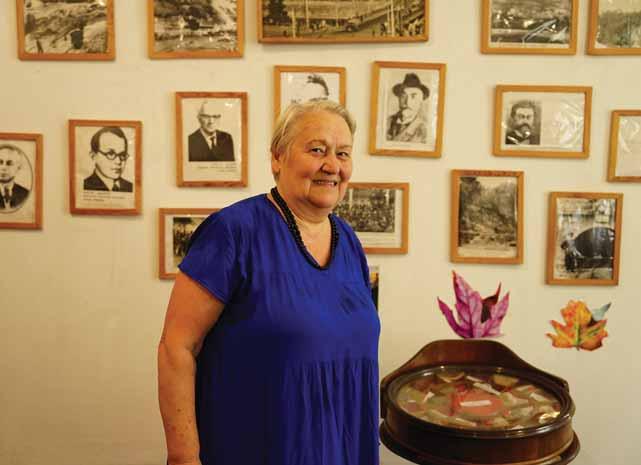
PUBLISHER & GM
George Sharashidze
COMMERCIAL DEPARTMENT
Commercial Director: Iva Merabishvili
Marketing Manager: Natalia Chikvaidze
EDITORIAL DEPARTMENT:
Editor-In-Chief: Katie Ruth Davies
tutions of the sort, but it is financially and otherwise supported by ‘Georgian Manganese Holding’ at its own goodwill. And my sincere kudos goes out to the company for this.
It is due to the sheer enthusiasm of its founder that the Chiatura Manganese
Mining History Museum continues to function- Ms. Celina Meskhi’s mining family, in which she grew up, being her inspiration. The industry evolved right in front of her eyes, the details and highlights of which are lovingly and professionally accumulated by her in the museum. Says the emotionally-narrating manager: “I got infected with the idea of creating this museum when I came across these valuable words in a novel by famous Georgian author Parmen Loria ‘In the Mines:’ The miners start working as the stars rise in the sky, and they relax only when the stars disappear.”
One might need weeks to go through all that is displayed in the Chiatura Manganese Mining History Museum, among

them thousands of excerpts from newspapers and magazines, historical photographs and various artifacts, some of them dating back to the late 1870s, when foreign industrialists and investors began frequenting this manganese-rich part of the world business, until all those old mining enterprises were nationalized by the celebrating-political-victory communist regime. On top of the mining history, this unique museum has preserved the past of the city and the life-story of many welldeserving men and women of Chiatura who have done more than we might imagine for the survival of this nation. This little but significant place definitely deserves better attendance and more attention on the part of the Georgian state.
Journalists: Ana Dumbadze, Vazha Tavberidze, Tony Hanmer, Emil Avdaliani, Nugzar B. Ruhadze, Michael Godwin, Mariam Gorkhelashvili, Mariam Mtivlishvili, Erekle Poladishvili
Photographer: Aleksei Serov
Website Editor: Katie Ruth Davies
Layout: Misha Mchedlishvili
Webmaster: Sergey Gevenov
Circulation Managers: David Kerdikashvili, David Djandjgava
ADDRESS 1 Melikishvili Str.
Tbilisi, 0179, Georgia
Tel.: +995 32 229 59 19
E: info@georgiatoday.ge
F: GeorgiaToday
ADVERTISING & SUBSCRIPTION
+995 555 00 14 46
E-mail: marketing@georgiatoday.ge
Reproducing material, photos and advertisements without prior editorial permission is strictly forbidden. The author is responsible for all material. Rights of authors are preserved. The newspaper is registered in Mtatsminda district court.
Reg. # 06/4-309












